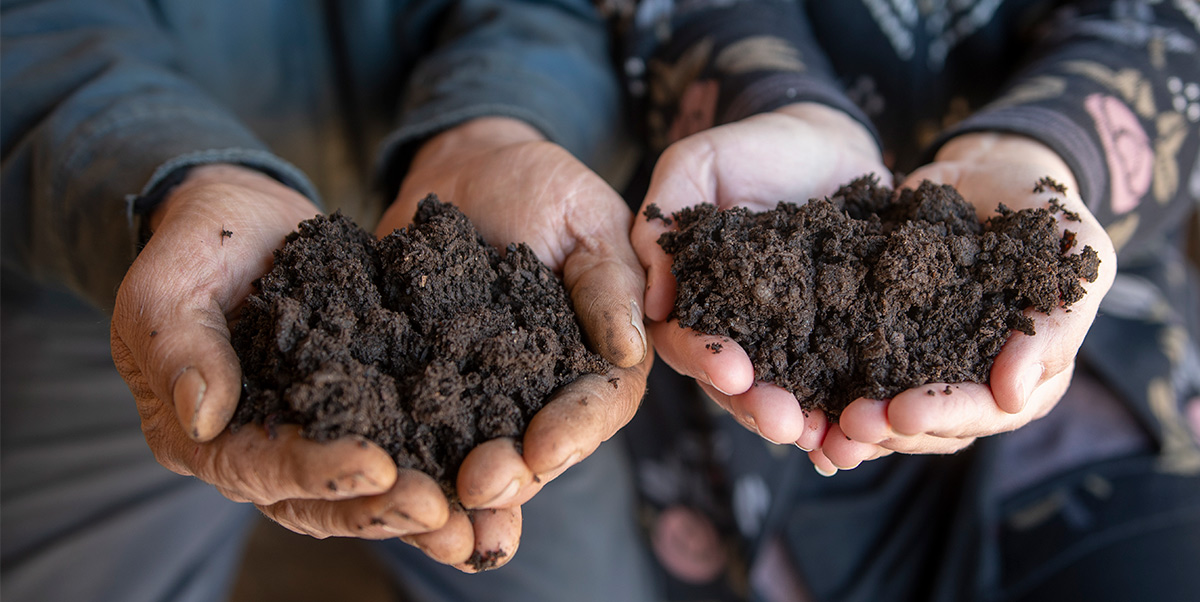The Vermont Sustainable Jobs Fund has participated in demonstration projects, assisted with industry level strategic planning, and provided business assistance and network development services for a variety of stakeholders in this evolving industry, particularly in waste-to-energy and composting.
Waste Management

Indications of Progress in Vermont
- The Vermont Foodbank increased the tons of food rescued from Vermont food enterprises by 206% from 2011 to 2016. This totaled 1,836 tons of food rescued in 2016.
- From 2012 to 2016 total waste generated in Vermont decreased 1.1% from 592,132 tons to 585,789 tons. Over the same period, total waste diverted from landfills increased by 3,064 tons (1.5%), with organics diversion increasing 9,723 tons (28.1%).
- The State of Vermont’s recycling/composting rate rose 3% in 2016.
- Food scrap composters accepted 15% more food scraps for composting in 2016 than in 2015.
- There are 18 registered compost drop-off facilities that are currently accepting over 12,800 tons of food scraps annually.
- Vermont has 20 anaerobic digesters sprinkled around the state which combined produce 17.2 MW of electricity (2015 data).
VSJF’s business assistance services have been enormously helpful in clarifying our business development goals and needs.
VSJF Program and Service Results
Vermont Tech Anaerobic Digester
In 2016, the Vermont Sustainable Jobs Fund and Vermont Technical College published the Community Anaerobic Digester Report to demonstrate how a community scale biodigester can keep excess nutrients out of watersheds and food residuals out of landfills while generating renewable electricity. VSJF served as a project partner with Vermont Tech, home of the anaerobic digester known as “Big Bertha.” The project was funded by Vermont State College resources and congressional directed awards from the U.S. Department of Energy, thanks to Senator Patrick Leahy.
- The Vermont Tech digester sent 2,231,477kWh to the grid and brought in $304,000 in revenue to the college in 2016, transforming over 2 million gallons of manure and over 1 million gallons of food waste into electricity and nutrient rich organic matter for farm fields.
- “Big Bertha” also serves as a learning laboratory at Vermont Tech, where students assist with its maintenance and learn functionality.
- Vermont Tech Community Anaerobic Digester Final Report to the U.S. Department of Energy
Strategic Planning
As part of the Farm to Plate Investment Program strategic planning process, the Nutrient Management section of the Farm to Plate Strategic Plan was published.
- The section analyzes the challenges and opportunities posed by universal recycling of food scraps and renewed pressure for improving on-farm nutrient management.
- VSJF assisted the Farm to Plate Food Cycle Coalition in mapping the organizations and expertise of stakeholders working on implementing Act 148 – the state’s Universal Recycling law. The Food Cycle Coalition’s asset mapping efforts are being used to inform the priority strategies best suited to assist with the transition from waste disposal to resource management for currently landfilled organic materials. An asset map illuminated the relative level of connectivity and coordination among these organizations and provided important insights that have led to improved alignment and coordinated action.
- VSJF has also supported the development of the Composting Association of Vermont by providing strategic planning facilitation to its board and staff.
Network Development
The Farm to Plate Food Cycle Coalition, a task force within the Farm to Plate Network, is comprised of organizations and individuals committed to building healthy and resilient communities where no one is hungry and no resource is wasted. The coalition played an important role in stewarding the suite of compost related resources, upon the dissolution of the Highfields Center for Composting in 2014 and is currently working to expand available information and educational resources about the Vermont Food Recovery Hierarchy.
The Food Cycle Coalition helps the Agency of Natural Resources stay informed on how to connect Universal Recycling to the food system and develop outreach materials for farmers and food enterprises about the opportunities emerging as the law is implemented.
VSJF maintains a suite of online composting resources (originally developed by the Highfields Center for Composting – and acquired by VSJF after Highfields dissolved as an organization in 2014). It serves as a resource for farmers, haulers, restaurants, food rescue organizations, and residents, as well as those outside of Vermont who are learning from our process.
Business Assistance
Through VSJF’s business assistance services, we have supported the development and expansion of a number of Vermont’s premier composting companies (e.g., Vermont Compost Company, Grow Compost), and have assisted others in assessing their business model and/or seeking funding.
- In FY17, VSJF provided business coaching services to the Vermont Compost Company, helped secure additional funding support for Tamarlane Farm, and facilitated a strategic planning retreat for the board and staff of the Composting Association of Vermont.
- VSJF provided business coaching services to Grow Compost in Moretown. In 2011 they had three full time jobs; in 2017 the opened a second facility in Hartland. Grow Compost supplies food scraps to the Vermont Technical College’s Anaerobic Digester.
The Vermont Tech digester project has fulfilled exactly what I hoped would be accomplished when I sought the funding. It is a true research digester, and Vermont Tech and the Vermont Sustainable Jobs Fund have put together a project that will add greatly to our knowledge of how to build and operate digesters at this scale, while giving Vermont Tech students first-hand experience with the technology, experience that can’t be matched by much larger research universities.





